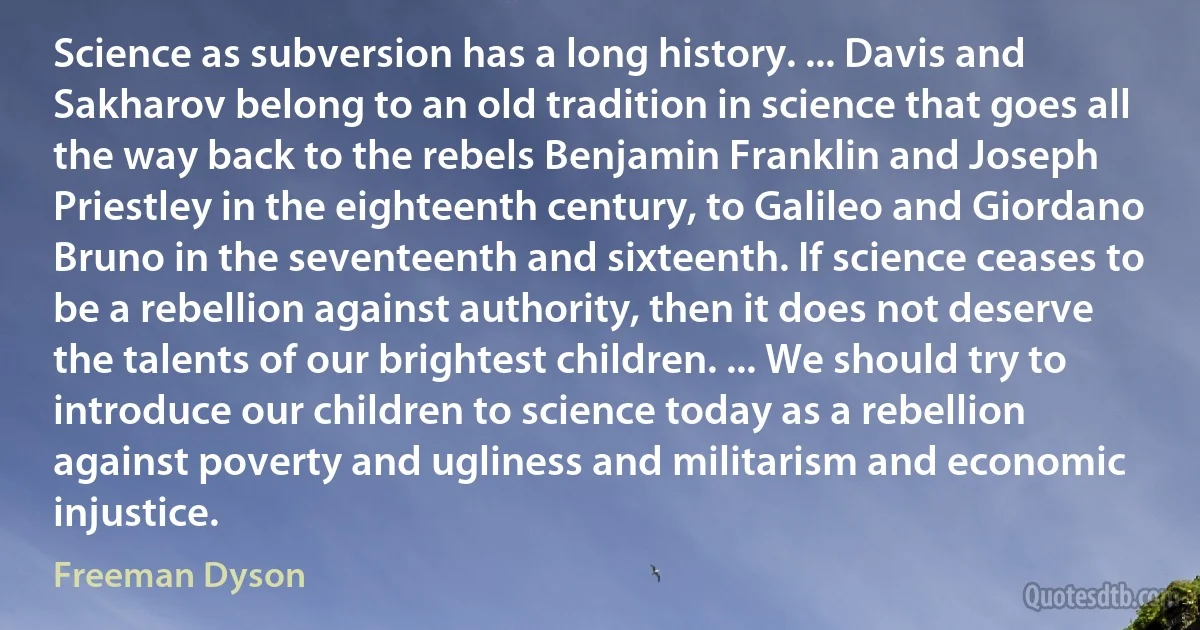Priestley Quotes
We are... bound to attach the greatest importance to the preliminary step taken by Lavoisier, who is even more justly called the father of modern chemistry than Kepler is called the father of modern astronomy. The exact claims of Lavoisier to this important place in the history of chemistry have been variously stated: ...since his time, and greatly through his labours, the quantitative method has been established as the ultimate test of chemical facts; the principle of this method being the rule that in all changes of combination and reaction, the total weight of the various ingredients-be they elementary bodies or compounds-remains unchanged. The science of chemistry was thus established upon an exact, a mathematical basis. By means of this method Lavoisier, utilising and analysing the results gained by himself and others before him, notably those of Priestley, Cavendish, and Black, succeeded in destroying the older theory of combustion, the so-called phlogistic theory.

Antoine Lavoisier
I think we must allow that dephlogisticated air is in reality nothing but dephlogisticated water, or water deprived of its phlogiston; or, in other words, that water consists of dephlogisticated air united to phlogiston; and that inflammable air is either pure phlogiston, as Dr. Priestley and Mr. Kirwan suppose [and as Cavendish formerly supposed], or else water united to phlogiston; since, according to this supposition, these two substances united together form pure water. On the other hand, if the first explanation be true, we must suppose that dephlogisticated air consists of water united to a little nitrous acid and deprived of its phlogiston; but still the nitrous acid in it must make only a very small part of the whole, as it is found, that the phlogisticated air, which it is converted into, is very small in comparison of the dephlogisticated air.

Henry Cavendish
What does Priestley mean, by an unbeliever, when he applies it to you? How much did he unbelieve himself? Gibbon had it right when he denominated his Creed, "scanty." We are to understand, no doubt, that believed the resurrection of Jesus, some of his miracles, his inspiration; but in what degree? He did not believe in the inspiration of the writings that contain his history. Yet he believed in the Apocalyptic beast, and he believed as much as he pleased in the writings of Daniel and John. This great and extraordinary man, whom I sincerely loved, esteemed, and respected, was really a phenomenon; a comet in the system, like Voltaire, Bolingbroke, and Hume. Had Bolingbroke or Voltaire taken him in hand, what would they have made of him and his Creed?

Joseph Priestley
Why did the problem of air become visible..? Why were Priestley, Boyle and Black able to see the question clearly enough..? ...because they had new tools. The air pump designed by Otto von Guericke and Boyle (...in collaboration with his assistant Robert Hooke...) were essential to Priestley's lab in Leeds. ...In a way, the air pump had enabled the entire field of pneumatic chemistry in the seventeenth century... [T]he air pump allowed you to... create a vacuum, which behaved markedly differently... even though air and the absence of air were visually indistinguishable.

Joseph Priestley
During the period in which the theory of phlogiston reached its zenith, four names stand out in bold relief. They are those of Joseph Black (1728–99), Henry Cavendish (1731–1810), Karl Wilhelm Scheele (1742–86), and Joseph Priestley (1733–1804). Of these men the last three were steadfast adherents of the theory, while Black seems to have been indifferent, devoting himself to his researches and placing his own interpretation upon his results.

Joseph Black

